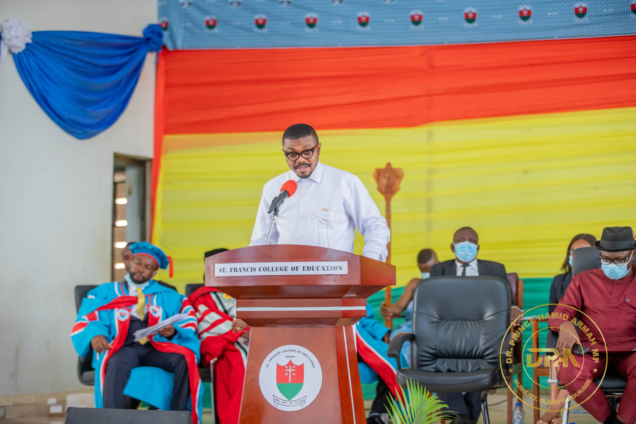Vice-Chairman of the Education Committee of Parliament, Dr Prince Hamid Armah, has reiterated government’s commitment to providing digital literacy training for teacher trainees.
Speaking as the Special Guest of Honour at the Investiture of Dr Adwoa Kwegyiriba as the new Principal of the St. Francis College of Education in Ho on Saturday, February 26, 2022.
Addressing the gathering, the Former Director-General of the National Council for Curriculum and Assessment (NaCCA) reflected on the importance of Information Communication Technology (ICT) in education delivery in the twenty-first century.
The Kwesimintsim MP explained how failing to train ICT teachers would impact effective teaching and learning.
“Given the value of teachers to national development, policymakers must continuously remain committed to the wholesome training and development of teachers, especially in the field of digitisation. We are in the Digital Dispensation, where many children are now referred to as digital natives because of their affinity for and heavy dependence on information communication technology (ICT) tools.
"Other studies further suggest that digital immigrants, i.e. the adults who have had to adapt to ICT, struggle to create content that can meaningfully engage and hold the attention of digital natives. This is perhaps one of the greatest challenges of education delivery in the 21st century,” he stated
In Ghana, research suggests that less than 15% of teachers use ICT in improving teaching and learning. This statistic indicates many students in Ghana, especially in basic schools with little access to ICT education and tools.
The One Laptop per Child policy implemented has improved access in many ways, but the ICT gap remains huge.
However, Dr Armah assured the gathering that government has recognised the need for digitisation in education and designed effective solutions to meet it accordingly.
He cited the TM1 laptop distribution scheme as an example of the government’s commitment to providing ICT tools to teacher trainees to empower them with ICT skills.
The Kwesimintsim MP, a key team member of the recent teacher education reforms in the country, also explained how the government has formulated policy to integrate ICT into the teacher training curriculum.
He emphasised that colleges have now been empowered with conducive policies to support ICT education.
“The government’s distribution of laptops to teachers is predicated on the assumption that teachers can competently use the devices to enhance teaching and learning."
He added that "The National Teacher Education Curriculum Framework (NTECF), the National Teachers Standards and the Bachelor of Education curriculum for Colleges of Education – all of which I was privileged to be actively involved in their development – strongly emphasise the need for pedagogical integration of technology in teacher education.
"The NTECF framework recognises ICT as ‘a key to effective communication, teaching and learning in the 21st century.’ Colleges are therefore well-equipped, in policy, to use this framework to develop teachers that can effectively manage the digital demands of teaching in the 21st century.”
The infusion of ICT into education delivery is a challenge beyond Ghana; the African continent has generally struggled to successfully infuse ICT due to a lack of supporting infrastructure at basic levels.
The United Nations Educational, Scientific and Cultural Organisation’s (UNESCO) 2015 outlook on Sub-Saharan Africa’s e-readiness in education was promising but slow.
However, a key recommendation for improving the situation was progressive education policy formulation and provision of ICT tools for teachers and students. In this regard, it appears Ghana is leading the way.
Latest Stories
-
Real Madrid beat Sevilla to keep pressure on leaders Atletico
42 minutes -
Liverpool put six past Spurs to go four points clear
44 minutes -
Manchester United lose 3-0 at home to Bournemouth yet again
47 minutes -
CHAN 2024Q: ‘It’s still an open game’ – Didi on Ghana’s draw with Nigeria
55 minutes -
CHAN 2024Q: Ghana’s Black Galaxies held by Nigeria in first-leg tie
2 hours -
Dr Nduom hopeful defunct GN bank will be restored under Mahama administration
2 hours -
Bridget Bonnie celebrates NDC Victory, champions hope for women and youth
3 hours -
Shamima Muslim urges youth to lead Ghana’s renewal at 18Plus4NDC anniversary
4 hours -
Akufo-Addo condemns post-election violence, blames NDC
4 hours -
DAMC, Free Food Company, to distribute 10,000 packs of food to street kids
5 hours -
Kwame Boafo Akuffo: Court ruling on re-collation flawed
5 hours -
Samuel Yaw Adusei: The strategist behind NDC’s electoral security in Ashanti region
5 hours -
I’m confident posterity will judge my performance well – Akufo-Addo
6 hours -
Syria’s minorities seek security as country charts new future
6 hours -
Prof. Nana Aba Appiah Amfo re-appointed as Vice-Chancellor of the University of Ghana
6 hours

